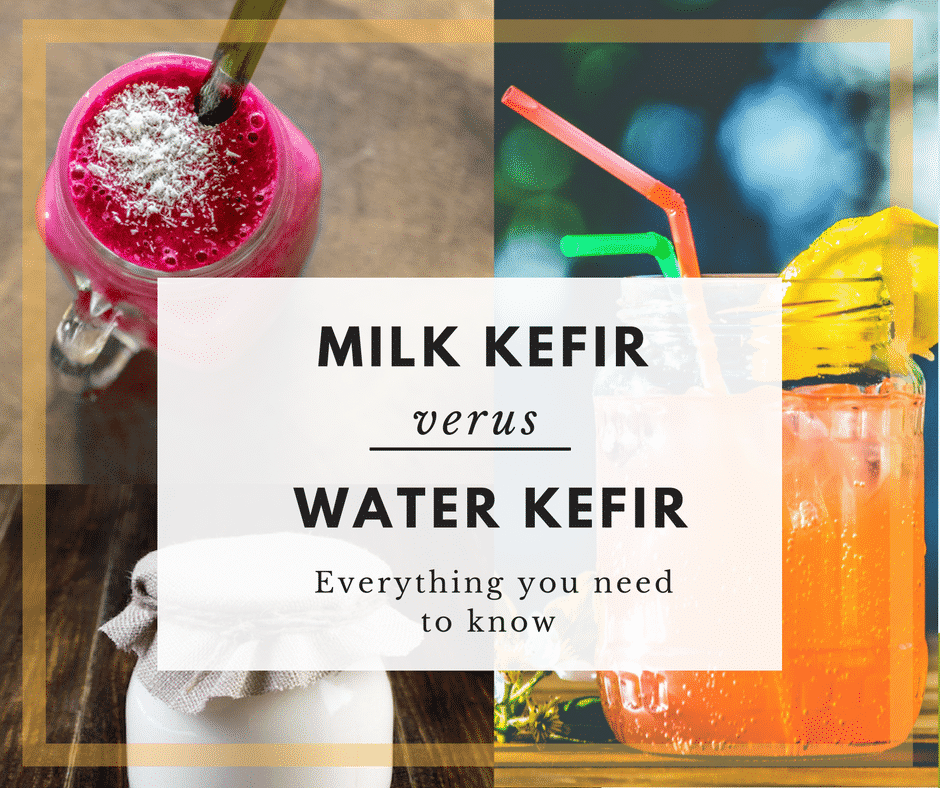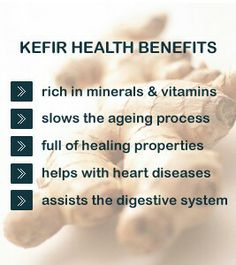Milk Kefir Vs. Water Kefir

MILK KEFIR Vs WATER KEFIR
Milk Kefir is made using Milk and Milk Kefir Grains . Water Kefir is made using Water , Sugar and Water Kefir Grains . Water kefir is generally taken by those who dont like milk . Both Milk and Water Kefir Drinks are essentially healthy to consume and have High Probiotic Content . While these two sister ferments have much in common, they are also unique in their differing probiotics, nutritional values, brewing times, tastes etc.
When it come to fermenting and reaping the probiotic benefits, the ultimate it to consume as wide a selection of ferments as possible, in order for the largest variety of probiotic bacteria to be given the chance of colonizing your gut and turning it back into a super complex microbial environment. So you can easily switch between milk and water kefir .
Basic Differences Between Water and Milk Kefir
Water and milk kefir are pretty similar but hold some basic differences. While both ferments are made with kefir grains (either the milk or water variety), milk kefir is made with dairy milk or a milk substitute such as almond milk, Coconut milk etc and water kefir is made from water sweetened with sugar.
Water kefir is a beverage, and milk kefir is more yoghurt like in consistency.
Taste
In taste milk kefir and water kefir are quite different. Milk kefir tastes like potent and tart yoghurt, while water kefir is akin to soda. If the fermentation of water kefir is stalled early, it will retain a level of sweetness. However as milk is not sweet to start off with, even halting fermentation early will not result in milk kefir tasting sweet. It will merely be less tart and strong tasting.
Both milk kefir and water can be flavored by adding in fruit or some other source of flavoring.
Probiotic Value
Often ferments come out neck and neck when compared on a probiotic level. However this is not the case with milk kefir and water kefir. Milk kefir is the clear winner in this area, totaling a staggering number of 30-50 different possible strains of probiotics, as opposed to water kefir’s 10-15.
Other Nutritional Elements
While the probiotic content plays a large role in the reason why kefir and other fermented products are growingly considered super foods, they invariably also contain other nutritional elements. These vitamins, minerals and other components are thanks to the base food of which the fermented item is made of. Therefore in the case of the kefirs, it is not surprising that milk kefir takes the score on this one as well.
As the base food of milk kefir is just that, milk, it contains all of the nutrients inherent to milk. It has been discovered that milk kefir contains high levels of the following:
Calcium & Magnesium
Analysis has shown that milk kefir contains quite hefty amounts of calcium and magnesium, in easily digestible forms. Both of these minerals can be difficult for the body to absorb if they are not in perfectly chelated states. As water kefir does not contain milk or another source of these minerals it does not contain calcium or magnesium.
Vitamin B1, B12, Biotin & Vitamin K
Besides calcium and magnesium, milk kefir also contains heightened amounts of vitamin B1, B12, B7 (biotin) and K. Water kefir boasts these as well due to the fact that they develop during fermentation, are do not need to be provided by the base food.
Protein
Lastly, milk kefir packs a protein punch, coming in at 10 grams to one cup, in which all eight of the essential amino acids are present. Water kefir does not contain protein, as its base food is sugar and water.
Fermentation Time
As both kefirs do not take long to ferment at all, the difference in ferment times does not usually play a great role in making one preferable to the other, however it might be that the one fits into your day to day patterns more conveniently.
Milk Kefir
The time it takes for your milk kefir to mature is largely dependent on your ratio of kefir grains to milk, and on the temperature. Depending on these two factors, milk kefir can take anywhere between 1 – 2 days.
Water Kefir
Also depending on temperatures and grains to sweet water quantities, water kefir can take between 1 and 2 days to ferment.
The fact that water kefir usually takes a 24 – 48 hour cycle to mature can make it easier to keep track of than kefir.
Lactose Intolerance Considerations
One last aspect we are going to look at is lactose intolerances. While milk kefir can be made with a lactose free form of milk (rice milk, almond milk, coconut milk etc), this can involve extra work as the grains need to be kept healthy by being exposed to dairy milk on a regular basis.
In this regard, water kefir can be a great dairy free alternative, without any additional hassle regarding using alternatives milk to make a lactose intolerant friendly version.
However, take into consideration that dairy kefir might not necessarily aggravate lactose intolerant allergy symptoms, as if it is left to ferment fully, much of the lactose will have been predigested by the bacteria. The Lactobacillus bacteria are also responsible for producing lactase in the gut, the very thing which an absence of will result in lactose intolerance. This is why some people have reportedly healed their dairy allergies by consuming fermented foods containing Lactobacillus species of bacteria, as once these have re-colonized the gut, it is possible for lactose allergies to recede.
Ease of Consumption
Ease of consumption is an important aspect when it comes to fermented foods, particularly if you are making and eating them for health reasons. It is a good idea to make the ferment which you can most easily incorporate into your daily schedule, than one which you end up not eating/drinking. Let’s have a look at where our two different kefirs can come into use.
Milk Kefir
Milk kefir is great if you like the taste of plain yoghurt, and are in the habit of eating store bought yoghurt. This way you can merely substitute in your home made kefir. If however you are not crazy about the flavor, you can easily incorporate kefir into smoothies or flavor it with fruit. The protein in kefir makes it filling, a great additive to shakes, liquid meals, and breakfasts which need to see you through the day.
Water Kefir
Many people consider water kefir as nature’s probiotic soda. It is fizzy, tangy, and slightly sweet, while being a super healthy addition to your diet. If you are trying to cut out soda or other sugar laden beverages, then water kefir might become your best friend. One can have a lot of fun playing around with flavoring water kefir (think fruit and more fruit!), and it is super easy to get kids and wary adults (think husbands) to try it as well.
So Which Wins the Race?
While dairy kefir pulls ahead with regards to probiotic value and additional nutrients such as readily absorbed calcium, water kefir shines in the fact that it is even quicker to make, one does not need to have any milk on hand, merely water and sugar – and it is super convenient to consume. Water kefir can take the place of regular soda, a habit many of us want to do away with. Water kefir is also great for kids, and anyone else who is not so crazy about the tartness and flavors of milk kefir.
However, beware that this mildness and sweetness which makes water kefir appealing to the less sour tasted of us, is an indication of the higher sugar levels than in that of milk kefir. In addition, milk kefir contains impressive amounts of protein, coming in the form of all eight of the essential amino acids.
Final Word
There are pluses to both types of kefir, milk kefirs lying mostly in probiotic value, nutritional value in the form of calcium, magnesium and lots of protein, and water kefir stepping up to the plate in terms of convenience, being able to act as a probiotic substitute for soda, and being a ferment which kids and less intrepid grownups can take to readily.



